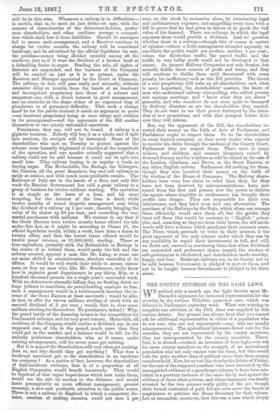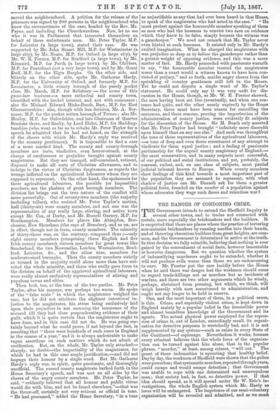THE COUNTY INTEREST ON THE GAME LAWS.
WE noticed only a month ago the light thrown upon Mr. Disraeli's argument for increased representation for the counties by the curious Wiltshire game-law case; which was debated in Parliament yesterday week. What was wanting to complete our criticism of the 15th June was supplied by this curious debate. Our ground has always been that you cannot ask for additional representation in virtue of a population who do not vote, who are not represented,—nay, who are usually misrepresented. The agricultural labourers do not vote for the counties, they are not represented by the county members, they are misrepresented by the county members. There- fore, it is absurd,—indeed, an inversion of true logic,—to ask for more county members on the strength of an agricultural population who not only cannot vote for them, but who would vote for quite another class of political views than these county members-hold. Now, let us test this view by the debate of Friday, on the case of the supposed poachers who were convicted by the unsupported evidence of a gamekeeper (shown to have been mis- taken in a previous instance of the same kind), and against the evidence of three other persons, and whose innocence was finally attested by the two persons really guilty of the act, though their formal confession of guilt did not even move the bench of magistrates to petition the Home Secretary for their release. Let us remember, moreover, that this was a case which deeply moved the neighbourhood. A petition for the release of the prisoners was signed by 200 persons in the neighbourhood who knew the circumstances of the case, headed by the Rev. Mr.
Payne, and including the Churchwardens. Now, let us see who it was in Parliament that interested themselves on behalf of these unfortunate men. Mr. Peter Taylor, M.P. for Leicester (a large town), stated their case. He was supported by Mr. John Stuart Mill, M.P. for Westminster (a large city), by Mr. Neate, M.P. for Oxford (a large city), by Mr. W. E. Forster, M.P. for Bradford (a large town), by Mr. Kinnaird, M.P. for Perth (a large town), by Mr. Childers, M.P. for Pontefract (not a very large town), and by Mr. Grant Duff, M.P. for the Elgin Burghs. On the other side, and bitterly on the other side, spoke Mr. Gathorne Hardy, M.P. for the University of Oxford, and formerly M.P. for Leominster, a little county borough of the purely pocket class, Mr. Marsh, M.P. for Salisbury — the scene of this game-law business—a mere cathedral and county town, identified with the landed interest, and not with commerce ; also Sir Michael Edward Hicks-Beach, Bart., M.P. for East Gloucestershire ; also, though with less decision, Mr. A. Sey- mour, M.P. for the pocket rotten borough of Totnes ; also Mr. Henley, M.P. for Oxfordshire, and late Chairman of Quarter Sessions there, and finally, by Lord Elcho, M.P. for Hadding- ton shire (who went so far as to rebuke Mr. Peter Taylor for a speech he admitted that he had not heard, on the strength of the cheers with which Mr. Hardy's reply was received by the country gentlemen). It is impossible to find a case of a more marked kind. The county and county-borough members are irate, vindictive, even horror-struck, at the charge of carelessness or prejudice brought against county magistrates. But they are tranquil, self-contained, reticent, disposed to make all sorts of Christian allowances, and to indulge in the virtue of Christian forgiveness, as regards the wrongs inflicted on the agricultural labourers whom they are supposed to represent. On the other hand, the spokesmen for these agricultural labourers, the possible (or impossible) poachers, are the phalanx of great borough members. The division list brings out the true nature of the conflict still more powerfully. Out of seventy-two members (the majority including tellers), who resisted Mr. Peter Taylor's motion, half (thirty-six) were county members, and not one was the representative of any really large, stirring, and active town except Mr. Cox, of Derby, and Mr. Russell Gurney, M.P. for Southampton. Members for places like Abingdon, Dor- chester, New Shoreham (the rape of Bramber), and so on, are in effect, though not in form, county members. The minority of thirty-three was, on the contrary, composed thus ;—only eight county members (comprising three English and five Irish county members), sixteen members for great towns like Sunderland, the two Newcastles, London, Westminster, Brad- ford, Leicester, &c., and the other nine, members for moderate-sized boroughs. Thus the county members strictly so termed in the majority could alone more than have out- voted the whole minority, and those who really gave force to the division on behalf of the aggrieved agricultural labourers, were really almost exclusively representatives of stirring and populous towns and cities. Then look, too, at the tone of the two parties. Mr. Peter Taylor, after his manner, was perhaps too warm. He spoke of the " false scale " in which the magistrates weighed the case, but he did not attribute the slightest intentional in- justice to the magistrates, his stress being exclusively laid upon their prejudices in not assuming the innocence of the accused till they had clear preponderating evidence of their guilt, which it is quite certain that the magistrates ought to have done, and in this case did not do. He was going cer- tainly beyond what he could prove, if not beyond the fact, in asserting that " there were hundreds of such cases in England in the course of a year," and it is always undesirable to make vague assertions on such matters which do not admit of verification. But, on the whole, Mr. Taylor only attacked— sharply, no doubt—the impartiality of the magistrates, for which he had in this case ample justification,—and did not impugn their honour by a single word. But Mr. Gathorne Hardy's reply was, in spirit, quite passionate, and thoroughly unofficial. The roused county magistrate barked forth in the Home Secretary's speech, and was met on all sides by the cheers of the angry county members. Mr. Peter Taylor, he said, " evidently believed that all honour and public virtue would die with him, and not be found elsewhere,"—that was the throw-off, certainly not very reticent or official in tone. " He had presumed," added the Home Secretary, " in a tone as unjustifiable as any that had ever been heard in that House, to speak of the magistrates who had acted in the case." " He must protest against the honourable member speaking of them as men who had the baseness to convict two men on evidence which they knew to be false, simply because the witness was a gamekeeper." We need not remark that Mr. Taylor never even hinted at such baseness. It existed only in Mr. Hardy's excited imagination. What he charged the magistrates with was prejudice so deep as to believe the gamekeeper rather than a greater weight of opposing evidence, and this was a mere matter of fact. Mr. Hardy proceeded with passionate warmth to say, " the honourable member treated the magistrates worse than a court would a witness known to have been con- victed of perjury," and so forth, amidst angry cheers from the sprinkling of country gentlemen still left in the House. Yet he could not dispute a single word of Mr. Taylor's statement. He could only say it was very unfit for dis- cussion in the House, though, as Mr. W. E. Forster showed, the men having been set free (eventually, and when one sen- tence had quite, and the other nearly expired) by the Home Secretary, there must have been reason for cancelling the sentences, and these reasons, proving the imperfection of the administration of county justice, were evidently fit subjects for the discussion of the House. Sir M. Beach only asserted that Mr. Peter Taylor had brought "infinitely more discredit upon himself than on any one else." And such was throughout the tone of these representatives of the agricultural labourers, —a tone of deep and even fierce resentment of any attempt to vindicate for them equal justice ; and a feeling of passionate partizanship for the unpaid county magistracy of England,— the most conservative, and in many respects most successful, of our political and social institutions, and yet, probably, the coarsest, rudest, and, on one class of subjects, most partial judicial tribunal known to Europe. When county members show feelings of this kind towards a most important part of the population they are assumed to represent, with what shadow of justice can Mr. Disraeli ask for them a greater political force, founded on the number of a population against whose advocates they wage such fierce and relentless war ?































 Previous page
Previous page